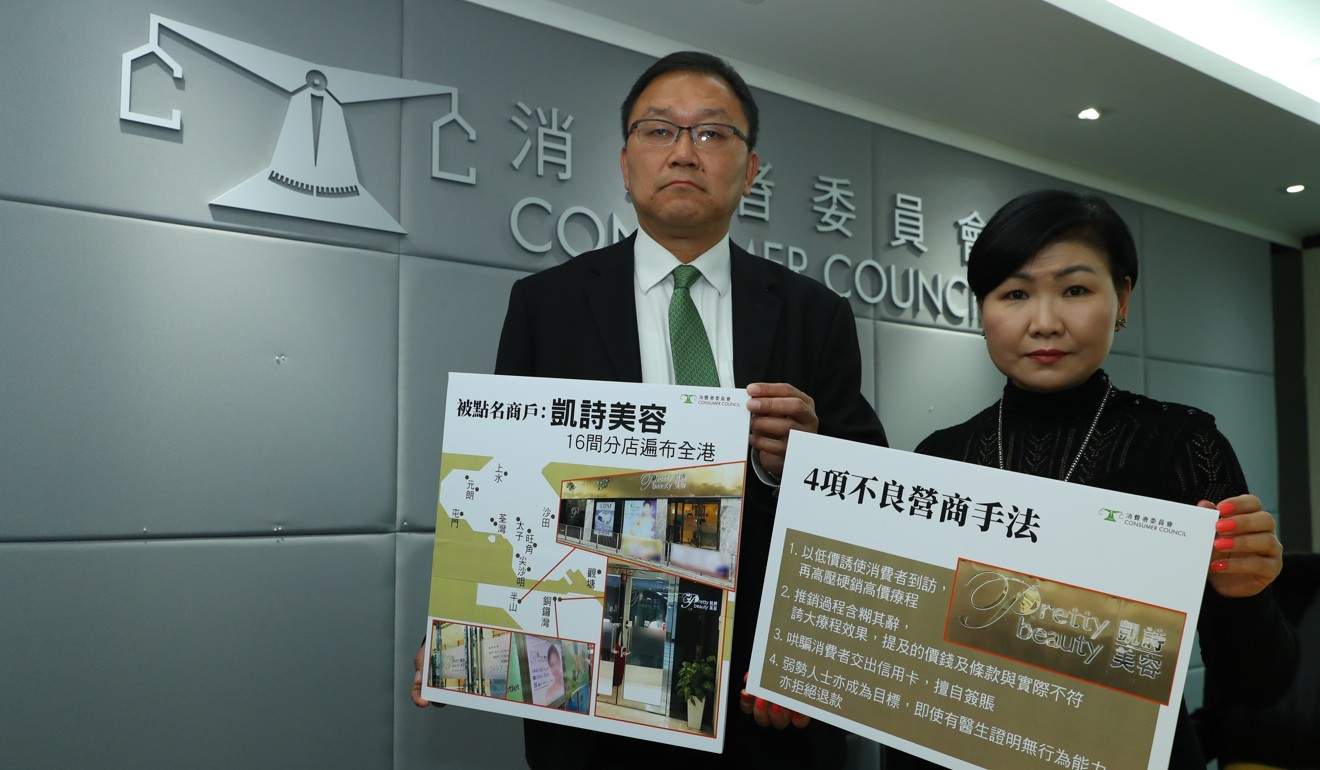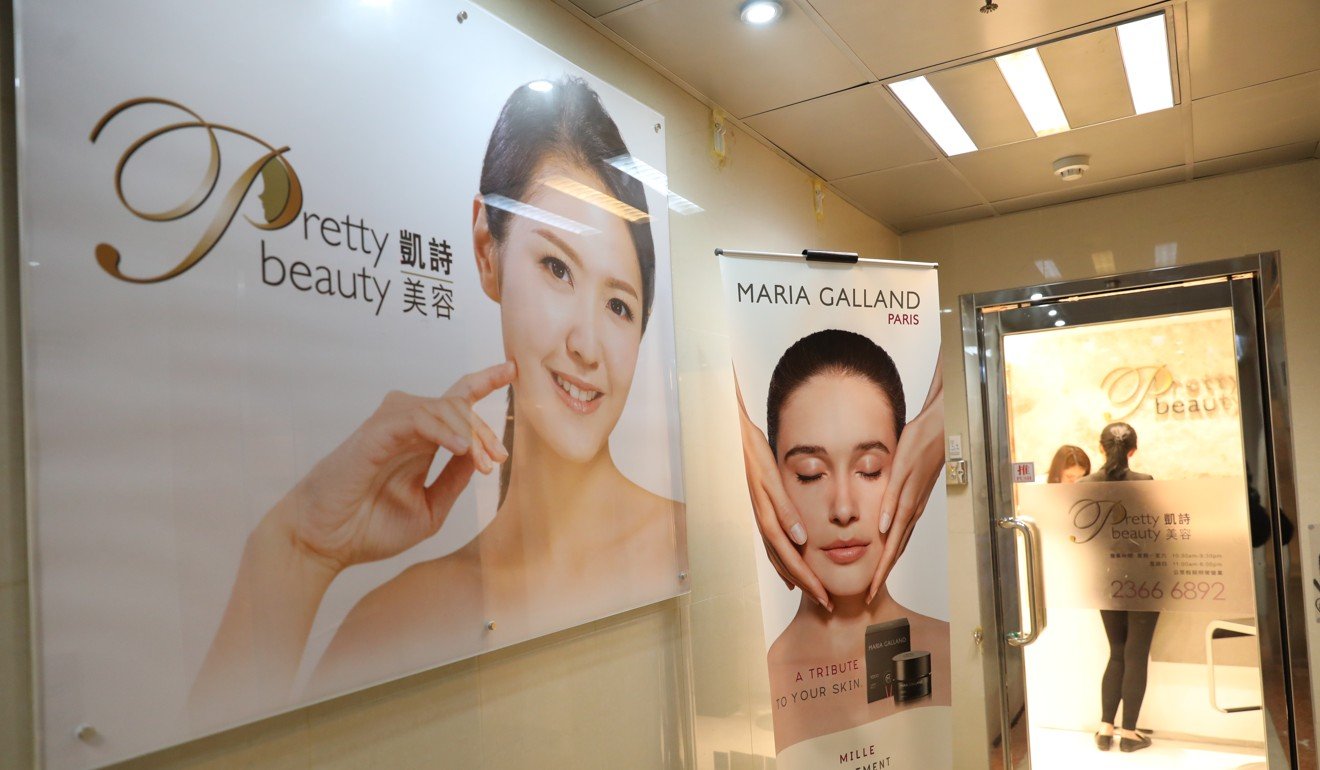
Pretty Beauty Centre in Hong Kong rebuked over cases of unscrupulous sales tactics – including putting pressure on disabled people
- One victim was disabled after car crash but signed five contracts for a total of about HK$37,000 with firm’s Sheung Shui branch
- Consumer Council met with firm in April but since then has received further 19 complaints
The Consumer Council of Hong Kong has reprimanded a beauty service group over unscrupulous tactics after receiving more than 80 complaints over the past three years.
The watchdog said the 82 complaints against Pretty Beauty Centre recorded from 2016 to October this year had involved about HK$2.4 million (US$300,000), of which 50 cases – or 60 per cent – were related to improper sales practices.
Professor Wong Kam-fai, chairman of the council’s trade practices and consumer complaints review committee, said the company had obtained credit card payments without the consumers’ consent, and when it was found some of the victims were disabled, refused to refund them.
Wong said one victim was a man who had suffered a brain injury in a car crash and was registered disabled. He signed five contracts for a total of about HK$37,000 with the firm’s Sheung Shui branch.
His brother discovered it and asked for a refund. But the firm refused, insisting the man had paid voluntarily.

“When he can prove he is incapacitated, then the company should refund according to the law. But it totally rejected it. We think it is very unreasonable,” the council’s chief executive Gilly Wong Fung-han said.
The watchdog said it met with a member of staff at the company in April and urged them to stop all malpractice, but after that, it received a further 19 complaints of which only two could be resolved. Seven others were unable to reach a consensus and the rest received no response from the group.
Gilly Wong said a lot of beauty companies were cooperative when complaints were filed against them but not this group.
“When we tried to get in touch, they avoided us. They were uncooperative and left cases unhandled. It keeps undermining consumers’ interests,” she said.
Recent health emergencies at Hong Kong beauty clinics
Pretty Beauty Centre has 16 branches, Wong said, and more cases were seen at its Tuen Mun branch though also at shops in Mong Kok and Causeway Bay.
Wong Kam-fai said the company had used low-cost trial sessions or mystery shopper recruitment to lure consumers to its branches and then used high-pressure sales tactics until the customers were worn out.
He said the firm used different excuses, such as free gifts or a lucky draw, to obtain credit cards for registration, assuring clients they would not be used for payment. But it then used the cards without the explicit consent of the consumers.
Wong added the resolution rate of complaints against the company over the last three years was only 25 per cent, marking a big contrast when compared with the 73 per cent in general cases or 52 per cent in cases related to the beauty industry.

The council said it had passed 50 cases to the Customs and Excise Department.
A spokesman for the Customs and Excise Department said it received a case related to Pretty Beauty Centre this month. The case was referred by the council and an investigation is under way.
He added that every case was unique and officials had to make judgments based on results and related evidence from the probe.
She added that consumers should be vigilant, and if they really had signed contracts they did not want, they should record or write down the process to facilitate law enforcement procedures.
The Post has contacted Pretty Beauty for comment.
Beauty clinic blunders in Hong Kong reveal need for strict regulation
The council received 1,147 complaints about beauty services last year and 881 in the first 10 months of this year.
In April the watchdog proposed a cooling-off period for five types of contract, including deals worth more than HK$500. It would apply to beauty and fitness deals that run for at least six months or which involve prepayment, while those for timeshares would be for more than a year.
But bosses have pushed back against the suggestion, claiming it would penalise entire industries and bring financial instability to businesses.
Commerce minister Edward Yau Tang-wah has said the government will submit a bill to the legislature before July 2020 and the goal is to submit a proposed framework before the end of the year.
Last year Hong Kong customs conducted more than 4,000 checks and inspections, but only 108 were related to consumer protection, and 68 ended with successful prosecutions.
A sales manager was found guilty of breaching the Trade Descriptions Ordinance by forcing a customer to buy a fitness package. The manager was last year sentenced to 160 hours of community service.
In another case, a beautician and a beauty consultant were each given 200 hours of community service for forcing a customer to buy services.
Under the ordinance, any trader who applies a false or misleading trade description to a service or product using aggressive commercial practices or bait advertising is liable to a maximum fine of HK$500,000 and up to five years in prison.


